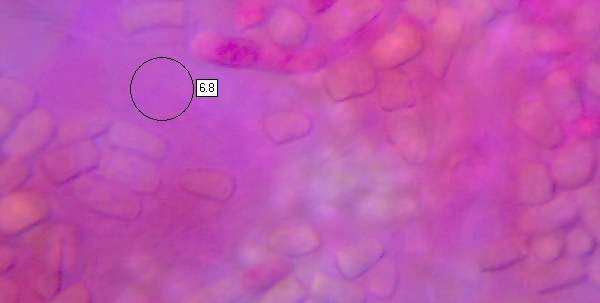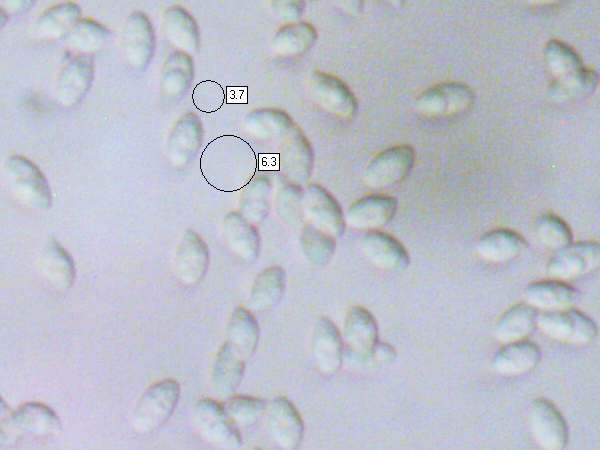Cystoderma jasonis (Cooke & Massee) Harmaja - Pine Powdercap
Phylum: Basidiomycota - Class: Agaricomycetes - Order: Agaricales - Family: Agaricaceae
Distribution - Taxonomic History - Etymology - Identification - Culinary Notes - Reference Sources
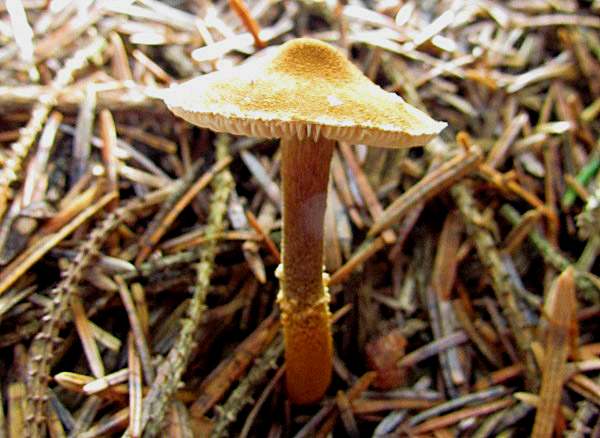
These colourful little mushrooms look rather like dark specimens of the Earthy Powdercap, which are most commonly seen in mossy grassland habitats. The lower stem is covered with large granules, while the smooth upper stem is often (as here) flushed purple.
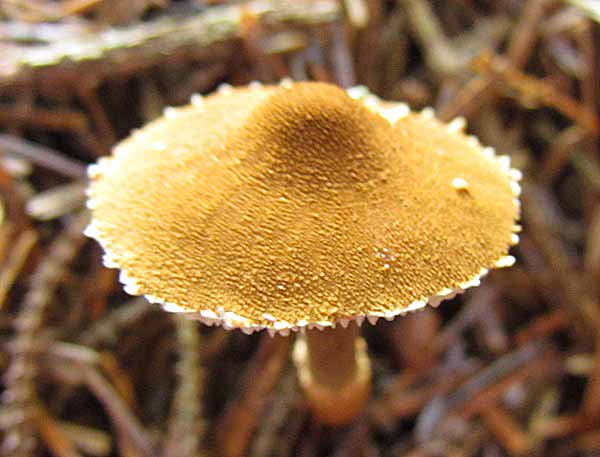
Distribution
Uncommon but far from a rare find in Britain, this mainly woodland mushroom occurs in sites scattered across England, Wales, Ireland and scotland, but it is most common in the conifer plantations and forests of central Scotland. The Pine Powdercap is also recorded from other countries on mainland northern Europe and from parts of North America.
Taxonomic history
When British mycologists Mordecai Cooke and George Edward Massee (1850 - 1917) described this species in 1888, they gave it the scientific name Agaricus jasonis. In 1978 the Finnish mycologist Harri Harmaja (b.1944) transferred the Pine Powdercap to the genus Cystoderma, creating its currently accepted scientific name Cystoderma jasonis.
Synonyms of Cystoderma jasonis include Agaricus jasonis Cooke & Massee, Armillaria jasonis (Cooke & Massee) Sacc., and Cystoderma amianthinum var. longisporum Kühner.
Etymology
Powdercaps usually do have granular cap surfaces - the generic name Cystoderma means 'blistered skin' - but their most distinctive feature is the marked contrast between the smoothness of the stem above the ring and its scaly surface below. The overall impression is of a mushroom wearing an ill-fitting stocking.
The specific epithet jasonis may perhaps be in some way a reference to the mythical ancient Greek hero Jason, who led the argonauts in a quest to seize the golden fleece (which perhaps represents the golden cap and lower stems cales of this mushroom)... but maybe it's not.Who knows? Any other suggestions?Identification guide
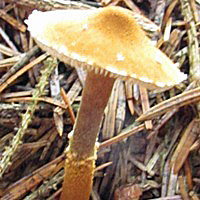 |
Cap1.5 to 3.5cm across; initially convex, becoming broadly convex or flat, usually with a broad umbo; colour variable dark ochr to reddish brown; surface granular, sometimes radially wrinkled and often with a veil-fringed margin. In the cap context immediately below the pileipellis, rectangular asexual reproductive cells, known as arthroconidia or arthrospores, form as the mushroom matures. Stem4 to 7cm long and 4 to 8mm diameter; colour pale ochre above ring; ochre flushed lilac or purplish and smooth or very finely granular above ochraceous-cream ring zone, darker ochre and very scaly below. |
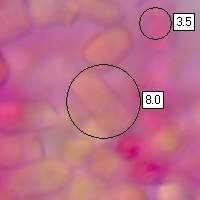 |
ArthrosporesThe photomicrograph on the left shows arthroconidia 7-10 x 3.5-5μm in the cap context below the cuticle of Cystoderma jasonis.
|
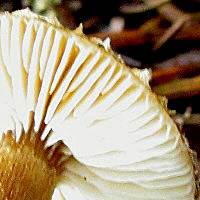 |
GillsAdnate, crowded; white at first, becoming pale cream. |
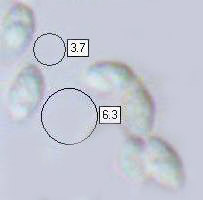 |
SporesEllipsoidal to almond shaped, smooth, 6-7.5 x 3-4.5μm; amyloid.
Spore print
White or very pale cream. |
Odour/taste |
Strong and unpleasant mouldy odour; no significant taste. |
Habitat & Ecological role |
Saprobic most commonly in conifer woodland on acid soil; occasionally on mossy acid heathland. |
Season |
Summer and autumn. |
Similar species |
Cystoderma amianthinum is most often found in mossy acid grassland; is has no significant odour and its spores are shorter with a lower Q value (length to width ratio) than those of Cystoderma jasonis. |
Culinary Notes
Cystoderma mushrooms are generally considered inedible, and there is speculation that at least some species in this genus may be toxic.
Reference Sources
Pat O'Reilly; Fascinated by Fungi, 2016.
Dictionary of the Fungi; Paul M. Kirk, Paul F. Cannon, David W. Minter and J. A. Stalpers; CABI, 2008
British Mycological Society (2010). English Names for Fungi
Taxonomic history and synonym information on these pages is drawn from many sources but in particular from the British Mycological Society's GB Checklist of Fungi.
Fascinated by Fungi. Back by popular demand, Pat O'Reilly's best-selling 450-page hardback book is available now. The latest second edition was republished with a sparkling new cover design in September 2022 by Coch-y-Bonddu Books. Full details and copies are available from the publisher's online bookshop...

